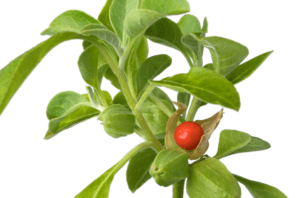We are assaulted every day by input – overflowing inboxes, cell phones brimming with messages, the airwaves filled with news. And the news isn’t good: the pandemic across the world and close to home, with wars and mass shootings in between. Add to that, personal stress of work – too much of it, or not enough, with inflation and bills to pay and kids to take care of. We live, eat, and breathe stress. [This article, “Chasing Calm: Adaptogens Offer Possibilities in 21st Century Wellness” was originally published in HealthXWire]
And our bodies react. The stress hormone cortisol floods our systems. Our breathing quickens, our pulse rises, and glucose is released into our bloodstream to supply quick energy to our large muscles. Our “fight or flight” natural instinct to survive kicks into high gear, ready to help us defend ourselves until the danger has passed.
But in our 24/7 culture, the constant barrage of stressors never ends. Our bodies keep releasing cortisol, trying to keep up, and the physical manifestations of prolonged exposure to cortisol are profound. High blood pressure, heart disease, heart attacks and strokes result. We gain weight and suffer from digestive problems. Our immune systems are suppressed. We’re subject to anxiety and depression, and we can’t sleep.
Adaptogens – traditional medicine in a new century
Remedies for stress reduction abound, but some are better known than others. New on the scene in Western culture is a class of herbal remedies well-known in Eastern medicine called adaptogens. They get their name from their purported ability to “adapt” to an individual’s specific needs by calming or energizing the body. .
Medicinal mushrooms, herbs and roots have been featured in Traditional Chinese Medicine (TCM) and Ayurvedic practices for more than 2000 years. Ancient scripts documented their use; the first book entirely devoted to the description of herbs and their medicinal value was Shen Nong Ben Cao Jing, written in the Eastern Han dynasty of China (25-220 AD). Associated with Taoism, their images in art began around 1400 AD.
While adaptogens were used throughout Europe during World War II, the U.S. has seen widespread interest in them relatively recently. The Cleveland Clinic now recommends their use, describing adaptogens as capable of aiding the body’s resilience against physical, emotional and environmental stress.
The body’s main stress response system is known as the hypothalamic-pituitary-adrenal (HPA axis). The primary function of the HPA axis is to release glucocorticoids, including cortisol. Adaptogens mainly work by influencing the HPA axis, and by doing so, they are believed to return the body back to a state of balance (homeostasis). For example, when you’re under stress, an adaptogen will reduce elevated cortisol levels. If you experience chronic fatigue with low cortisol levels, an adaptogen will increase the level of cortisol in your body. Dr. Frank Lipman, who specializes in the fields of integrative and functional Medicine says, “Think of adaptogens like your body’s thermostat.”
One of the Center’s recommended adaptogens is ashwagandha, an evergreen shrub also known as Indian winter cherry or Indian ginseng. Some people use it to slow down and unwind at the end of the day; others rely on it for a boost of energy in the morning.

There are more than 70 plants and herbs that fall into the adaptogen category. In addition to relieving stress, some of these also increase attention and endurance, according to registered dietician Sarah Thomsen Ferreira of the Cleveland Clinic’s Center for Integrative and Lifestyle Medicine. Adaptogens are also taken to relieve headaches, high blood pressure, insulin resistance, and a host of other ailments.
Thomsen Ferreira says those varied benefits are seen in research on ashwagandha: “Taking 300 milligrams per day of ashwagandha not only reduced cortisol, but also reduced food cravings, perceived stress and body weight.”
There are few such studies in Western medicine, however. Most scientific research on adaptogens has examined only animal subjects or cell samples, so little concrete evidence has been gathered about their effects on human health. Nonetheless, they continue to grow in popularity. In addition to ashwagandha, common adaptogens include American ginseng, Asian ginseng, eleuthero, and rhodiola.
Medicinal mushrooms play a prominent role in alternative medicine, and some of the best-known fungi are recognized for their adaptogenic properties. (These are different than the hallucinogenic variety popularized a generation ago.) Of these, three medicinal mushrooms— shiitake, maitake, and reishi –are the most important and widely used.
Primarily grown in Japan, shiitake mushrooms are thought to boost longevity and reduce inflammation. Shiitake mushrooms are rich in B vitamins and are believed to have antiviral and antibacterial properties as well. In addition, a study published in the Journal of Obesity concluded that shiitake could help reduce and prevent body weight gain and the build-up of fat. And a recent study published in the Journal of the American College of Nutrition found that shiitake can help boost immune function, improve cell function, aid gut immunity, and reduce inflammation.
Known as the “dancing mushroom,” Maitake is much loved in Japan and is known throughout Asia as an adaptogen with broad healing properties. It is thought to help the body achieve optimal balance in the presence of physical and mental stress. Research has also shown it to benefit those that suffer from chronic fatigue syndrome. In addition, recent studies indicate that Maitake can help activate cells that stimulate the immune system’s T-cells.
Then there is the “the Elixir of Life,” the “Queen Healer, and the “King of Mushrooms.” Its Chinese name is Ling Zhi, which means “herb of spiritual potency.” It is also known as Reishi.
Reishi, the ”Three Treasure Herb”


Around 396 BC, deep in the Changbai Mountains of Ancient China, red-brown Reishi mushrooms the size of dinner plates were discovered growing on dead and fallen logs of hemlock and other deciduous trees. A dark, fan-shaped mushroom with a shiny, glossy exterior and a woody texture, it soon became one of the most revered icons of Chinese medicine.
It was more than rare – before cultivation, only two or three mature trees out of 10,000 would host reishi on their trunks. Given how rare it is to find Reishi in the wild, for nearly 2,000 years it was reserved for ordained royalty in China. Yet by 1400 AD, images of the mushroom appeared in paintings, furniture, and carvings. Emperors of the Qing dynasty were said to exchange gifts of ceremonial ruyi scepters sculpted to resemble reishi, called so-called mushroom of immortality.
A few of the many health benefits attributed to reishi mushrooms include control of blood sugar levels, strengthening of the immune system, protection of the liver. In Traditional Chinese Medicine, Reishi is known as the “three treasure” herb that harmonizes jing (life force), qi (energy), and shen (spirit). It is believed to cause the An Shen effect, which translates in English to “calm the nerves and soul.”
Gummies at bedtime
But reishi mushrooms do not give up their gifts easily. For all their celebrated qualities – they don’t taste good. Tough and bitter, fully grown Reishi mushrooms were dried in Traditional Chinese Medicine, then cut into slices, boiled in hot water, and steeped to make a tea or soup. In modern times, manufacturers of Reishi products have adapted a new processing technique of boiling Reishi at high pressure, allowing the active ingredients to form a tincture or an extract powder, like Anima Mundi’s reishi powder or Gundry MD M Vitality’s reishi tinctures. Like other adaptogens, reishi can be taken as capsules, or added to food and beverages; wellness company Malama Mushrooms makes reishi coffee and cocoa. Other adaptogenic plants can be dried, ground up and steeped in hot water in the same manner as tea; several different types of tea blends on the market use adaptogens as the main ingredient.
Then there are gummies, sold by Troop Nutrition of Florida, organically and sustainably cultivated in the U.S. they come in three flavors: mixed berry, a reishi end-of-day formulation meant for balance and calm; peach mango, a “brain boost” featuring lion’s mane mushrooms; and what the company calls its “hero product” – both reishi and lion’s mane together with maitake, turkey tail, chaga, and cordyceps in a “daily restorative strawberry passionfruit gummy.
Co-founders Stephanie Moyal and Jake Mellman say the company’s goal is to “demystify mushrooms and make them approachable.” The two are cousins, whose collaboration began when they found themselves sharing living space during a COVID lockdown early 2020. While binge-watching documentaries, they ran across Fantastic Fungi, which inspired them to investigate the wellness benefits of mushrooms. Then there came more unexpected time together when Moyal was laid off from a hospitality job and Mellman was recovering from a broken leg. At that point, they tried growing mushrooms in Mellman’s closet and finally set out to create products that could offer the health benefits of mushrooms even to those who usually don’t care for their taste.
The melatonin hangover
The deep sense of calm and relaxation offered by reishi mushrooms paves the way for the body’s nightly remedy for stress: sleep. But a peaceful night’s rest is a precious commodity now more than ever: The American Sleep Association reports that 30 percent of American adults are experiencing insomnia. Another 37.5 percent don’t get more than seven hours of sleep per night, out of the eight or nine recommended. No wonder, then, that the National Sleep Foundation reports that nearly half of Americans feel that poor or inadequate sleep affects their daily activities at least once per week. No wonder, then, that the sleep-deprived are reaching for bottles of relief like never before.
Unlike sedatives or melatonin supplements, reishi does not directly induce sleep. Instead, the naturally occurring compounds within reishi mushrooms work to support stress management and a sense of calm. It also contains a potent amount of a compound called triterpene, shown in studies to help reduce stress, improve sleep, and boost mood.
Though reishi and other mushroom-based products grow in popularity, melatonin continues to dominate the sleep aid market, with sales increasing 150% between 2016 and 2020. Last year, the National Institutes of Health reported that 3.1 million Americans used melatonin supplements to fall asleep, and Business Insider reported that Americans spent more than $825 million on melatonin supplements in 2020—a 42.6% year-over-year increase.
It’s no mystery as to why melatonin is so popular – it works. The supplement has been proven to help consumers fall asleep faster, stay asleep longer, and get deeper, higher quality sleep. Melatonin is particularly effective in preventing or reducing jet lag and helping people who work variable shifts.
Also called “the sleep hormone,” melatonin is the main neurohormone secreted by the brain’s pineal gland, which produces melatonin in response to darkness. Derived from tryptophan, melatonin runs the body’s 24-hour internal clock and controls the sleep wake cycle, helping to promote sleep while inhibiting wake-promoting signals.
Despite melatonin supplements’ effectiveness, however, there’s a catch: increasing numbers of melatonin users are experiencing what’s known as a “melatonin hangover.” A common side effect of melatonin, it brings daytime sleepiness, headaches, and in some cases, nausea. The hangover typically arises from taking melatonin too late at night, because people taking melatonin often expect the drug to work more like a sleeping pill than a sleep aid. “The hormone is for the timing of sleep,” says Christopher Winter, M.D., of Charlottesville Neurology and Sleep Medicine “It’s not a sedative. It’s not meant to knock someone out.”
Experts say the body naturally produces a surge in melatonin around 7 p.m. That’s why melatonin is really meant to be taken at sundown, to help boost the body’s natural melatonin production and send the brain a message that bedtime is coming. If not taken properly, the supplement can actually make it harder to sleep.
Melatonin hangovers can also result from taking too much. A new study finds that more and more adults may be taking this substance at dangerously high levels. In 2018, adults in the United States took more than twice the amount of this sleep aid than they did a decade earlier, which may pose a health risk in some individuals.
Many people consider melatonin ‘natural’ since it is a supplement, and don’t worry much about taking even very high doses (>5 mg), The proper dosage, according to a 2001 study from the Massachusetts Institute of Technology, is 0.3 milligrams, However, many pills are sold as 3 grams or more —an enormous excess. “Ninety percent of the melatonin that’s sold currently is sold in an overdosage format,” says sleep expert Dr. Michael Breus. “If you look around, almost nobody sells it at [0.3 milligrams]; they sell it at three, five, even 10 milligrams. And that’s a problem, because you can indeed get melatonin “hangovers,” with too much of the substance in your body at the one time.” Part of the problem, experts say, is that it’s easy to assume that melatonin should just be taken in whatever dosage is readily available,
Also complicating the issue is variability of dosages among brands. Research has found that 71 percent of melatonin supplements did not meet the claims on the label. There is now concern that the quantities of melatonin in OTC preparations may exceed what the label displays by up to 478%.
Additional research has found that up to 26% of melatonin supplements contain serotonin, a precursor of melatonin, which, in excess, can cause potentially life threatening side effects. Serotonin syndrome can cause nervousness, nausea, vomiting and diarrhea. In severe cases, agitation, restlessness, and muscle spasms can occur, possibly leading to fever, seizures, coma, and even death.
But there is little regulators can do. In the U.S., melatonin is sold as a supplement, not regulated as a drug. Because melatonin is unregulated, the U.S. Food and Drug Administration doesn’t have oversight over the purity of ingredients or the accuracy of dosage claims. The same is true for adaptogen supplements.
A recipe for peace and calm
The benefits of Reishi mushrooms generally don’t appear shortly after consumption in the way that they might with pharmaceutical drugs. They take time to accumulate as the body adapts to the biological compounds. When taken consistently, however, the multitasking “queen healer,” as reishi is sometimes called, is believed to help induce Zen-like state of peace that helps to regulate rest cycles:
There are also new indications that reishi might be more directly helpful with sleep. In a study on rats, supplementation with reishi mushrooms reduced the amount of time for the rats to fall asleep and increased the total amount of time they slept. Researchers also say the rats exhibited fewer anxious behaviors, like fidgeting or other spontaneous activities.
While more study is needed to clarify the connections between reishi and sleep in humans, Western culture becomes increasingly familiar with adaptogens. As it does, more people may find it easier to turn away from stress and find calm in the form of morning smoothies, capsules, nighttime teas…or even a few gummies might do the trick.
Table of Contents


